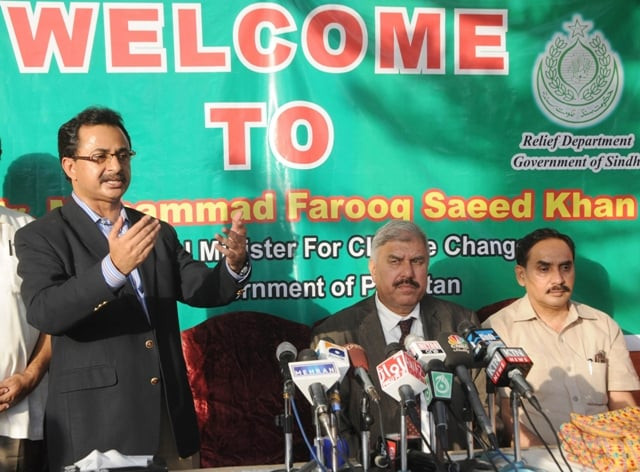Sindh seeks Islamabad’s help to feed people of drought-hit Tharparkar
Forecasts about floods have come to naught as Sindh has hardly received any rainfall this year.

The Sindh government has asked the federal government to help it deal with the fallout of the drought in Tharparkar, and has conceded that it will not be able to manage the disaster that has already affected 1.2 million people.
The barrage of forecasts for devastating floods from the meteorological department and disaster management agencies came to naught as Sindh has barely received rainfall this year. The Tharparkar district was officially declared as “drought-stricken” on August 19. Chief Minister Qaim Ali Shah asked federal climate change minister Rana Muhammad Farooq Saeed Khan to survey the situation on the ground.
Advisor Haleem Adil Sheikh made an impassioned plea to the federal minister in a press conference at Mohammad Ali Society on Saturday. The minister and National Disaster Management Authority chairman Zafar Iqbal Qadir were also present on the occasion.
“A drought doesn’t get the same kind of focus that floods do. We have to provide livelihood for the people, as no rainfall has meant that no farming can take place,” said Sheikh, before inviting the federal government to perform its own assessment of the situation.
According to the provincial government’s estimate, 240,000 families have been affected. The government needs to provide a 50-kilogramme bag of wheat to every family, every month. Each bag costs Rs1,563. For every month the drought continues, the government’s books will be hit Rs192 million. The total wheat compensation package, which will take care of the residents till June 2013, will cost Rs2.07 billion. The relief department is going to pick up half of the tab.
The provincial government will also need a total of Rs502 million every month for supplying rations, anti-parasitic drugs, life-saving drugs, syringes, vaccines, vehicles and labour.
When asked that what the federal and Sindh governments had done since Tharparkar was declared a drought-stricken area, Khan lashed out by saying that, “We don’t just step in like that. We come in when the chief minister calls us and asks for our help”. He added that mass migration from the disaster-hit areas will be controlled by the provincial government, and that he would try to get officials from the United Nations and other nongovernmental organisations to visit the areas as well.
Published in The Express Tribune, September 2nd, 2012.


















COMMENTS
Comments are moderated and generally will be posted if they are on-topic and not abusive.
For more information, please see our Comments FAQ